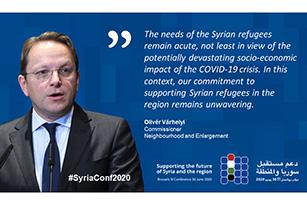
Friends, colleagues,
I am delighted to chair this panel on regional recovery in the face of COVID-19 crisis. Due to this crisis, we are speaking by video conference, but I hope at the next occasion it will be in person.
With such distinguished participants, I look forward to exchanging views with those at the forefront of dealing with the Syrian crisis at this panel. We aim here to discuss both the challenges at play in the region as well as take a forward look at the opportunities to promote recovery. Specifically, we will discuss how we might help reboot economies and promote sustainable stability, even as war unfortunately continues in Syria. We will also consider how to respond the challenges in the region, as the Middle East is crying out for a positive agenda.
For us to get to grips fully with the question of regional recovery, we must succeed in delivering the EU’s overarching objective in Syria: a Syrian-led and Syrian-owned lasting political solution. Parameters for that are well-known, as set by the UN Security Council Resolution 2254. We all know the detrimental impact of the conflict on the regional economy, the disruption of traditional trade flows, the Syrian war economy and political uncertainty.
Massive and enduring displacement of people from Syria continues to pose a challenge to infrastructure, service provision, social cohesion and the local economies of host countries. The strain has been exacerbated this year by additional complexities, such as the financial crisis in Lebanon, the impact of the collapse in oil prices and the economic and social fallout of the COVID-19 pandemic.
Let me start, therefore, by extending my sincere appreciation to the host countries, particularly Jordan, Lebanon and Turkey, for their extraordinary efforts and generosity in hosting many millions of refugees from Syria.
The EU and its Member States have provided over €20 billion in response to the Syrian crisis since 2011. With this, the EU has reached more than 6.7 million refugees from Syria and vulnerable people in host communities. We will next week at the ministerial conference announce a substantial funding pledge for this and next year. We both anticipate and expect that other donors will do the same. International assistance has made and is making a difference.
But we have to think beyond the immediate-term at solutions that will endure. As the conflict has evolved, so have needs. The EU response has shifted. From an initial focus almost exclusively on basic humanitarian needs to strengthening national systems of service delivery, to ensuring access to education and healthcare. To give those currently depending on assistance an opportunity to provide for themselves and their families and contribute to the societies where they live.
We will continue in this direction, working closely with the host countries as part of the answer to our determination of finding solutions that endure. The return of refugees, which can only be voluntary, is also part of this. In addition, a robust return monitoring system both cross-border and inside Syria is required. In the interim, the EU will consider how it can respond to the challenges emerging for those who take individual decisions to return.
The scale of the impact of the Syrian conflict is staggering, in terms of funding, needs or simply the numbers of refugees and displaced. Each such number means an individual experience, a life disrupted. The EU seeks in this fourth Brussels Conference to give voice to some of those individuals whose lives have been fundamentally changed.
The COVID-19 pandemic has had a huge impact across the region, as it has in Europe. The European Union quickly stepped up its efforts in response to the pandemic. In the field of health, our Regional Trust Fund in response to the Syrian Crisis (Madad), has just adopted a package of EUR 55 million of new funding. We are re-orienting our assistance to address the economic and social consequences of the pandemic, working with our Member States and the European banks in our ‘Team Europe’ approach. And we have boosted support to small businesses and provided macro-financial support.
Looking ahead, the European Union has proposed an increase in resources for development cooperation within our next budget, with far greater emphasis on using innovative instruments to unlock and leverage private sector financing. Let me stress that the EU will work together with other countries to unlock the full growth potential of the region. This must include fostering a business-enabling environment, improving governance, fighting corruption and implementing reforms in key sectors like energy, digital and the environment.
Amid the profound challenges faced by the region, the EU will continue to work in partnership with the governments, businesses and civil society of the region towards a positive agenda of recovery and economic development. And we must see to it, above all, that this Brussels Conference serves to further mobilise the international community behind UN-led efforts to achieve a lasting political solution to the Syria crisis.
Thank you.
Details
- Publication date
- 22 June 2020
- Author
- Directorate-General for Neighbourhood and Enlargement Negotiations
